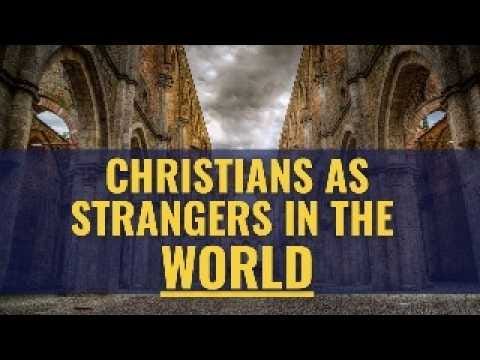My favourite writing among the Apostolic Fathers is the Epistle to Diognetus, especially chapter 5. Find below my translation, paraphrase, and a video with the paraphrase narrated with music. This is a beautiful text about how Christians were different in the Greco-Roman world, how they stood out, and were genuinely “weird” by the standards of the day.
Translation
For Christians are not distinguished from the rest of people by land or language or customs. Nor do they dwell in cities of their own making, nor do they speak any strange vernacular, nor practice a peculiar way of life. This teaching of theirs has not been deduced by the intellect or by thought of ingenious thinkers, nor do they promote any human doctrine as some are inclined to do. But while living in both Greek and barbarian cities, as each has obtained by lot, and as they follow the local customs, in clothing, cuisine, and in the rest of life, yet they show forth the wonderous and admittedly strange character of their own citizenship. They live in their own homelands, but as foreigners. They share all things as citizens, and suffer all things as foreigners. Every foreign country is their homeland, and every homeland is like a foreign country to them. They marry like everyone else, and they bear children, but they do not expose their offspring. They share their tables, but not their beds. They live in the flesh, but do not live according to the flesh. They pass their days upon the earth, but their citizenship lies in heaven. They obey the appointed laws of every city, and they even surpass the laws in how they live their own lives. They love all people even as they are persecuted by many. They are misunderstood even as they are condemned. They are put to death and yet they gain life. They are poor and yet make many rich. They lack all things and yet abound in everything. They are put to shame, yet are glorified in their disgrace. They are accused of evil yet are declared righteous. They are slandered and yet reply with blessings. They are insulted and yet offer compliments in return. When they do good, they are accused of being evil-doers. When they are penalized, they rejoice as people brought to life. They are attacked by the Jews as foreigners and are assailed by the Greeks as well. And those who hate them cannot even explain the cause of their hatred.
Paraphrase
The tale of the Christians is one that defies the conventions of the age. They are a people not bound by the borders of any land or language or custom, for they live by a spirit that transcends the normal distinctions of human existence.
Christians do not dwell in cities of their own making, nor do they speak some indecipherable tongue, yet their way of life is no strange aberration. Nor is their creed the product of idle speculation, or the whims of ingenious thinkers. Indeed, theirs is a living testament to a truth that transcends the normal limits of human life.
For while Christians walk the same streets as Greek and barbarian alike, they bear witness to a citizenship that is not of this world. They are at once citizens and foreigners, sharing in the joys and sorrows of all, yet ever mindful of a higher calling as citizens of heaven. They share their tables, but not their beds, for they embody a way of life that is at once familiar and yet profoundly alien.
Christians live in the flesh, yet they do not seek to gratify the flesh. They obey the laws of the land, indeed, in their own lives, they surpass the obligations of common law. They are loved by many, yet persecuted by more. They are misunderstood, condemned, and even put to death, and yet in their suffering, they find the path to true life.
Though they are poor, yet they enrich the lives of all whom they touch. They lack all things, yet they abound in everything. They are cast into dishonor, yet are glorified in their disgrace. They are slandered, yet they respond with blessings. When they do good, they are accused of evil, and when they are penalized, they rejoice as those brought back to life.
The Jews may assail them as foreigners, and the Greeks may sally against them, but those who hate them cannot even explain the cause of their hatred. For in the lives of the Christians, one glimpses the contours of a kingdom not of this world, a testament to an a light that darkness cannot be extinguished, a triumph of conviction against a hatred they do not deserve.




Thank you so much for this. I am preaching Acts 2:42-47 Sunday, and this is a great complement to it.